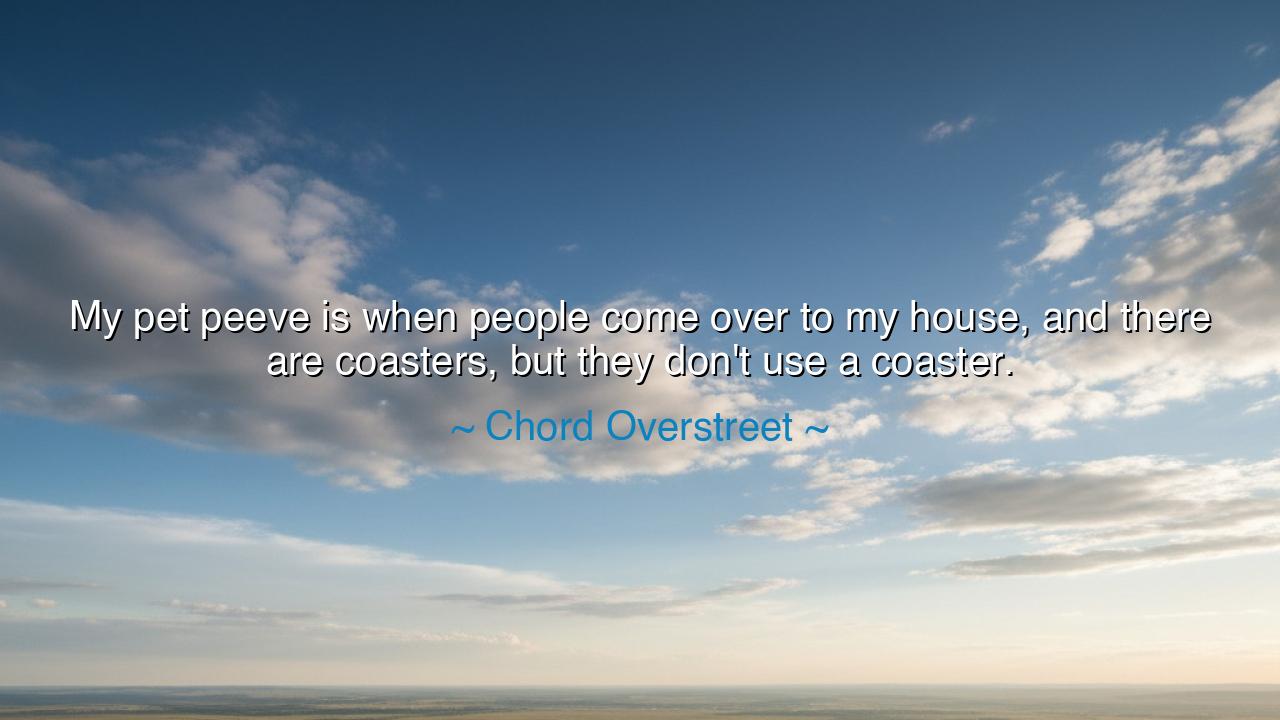
My pet peeve is when people come over to my house, and there are
My pet peeve is when people come over to my house, and there are coasters, but they don't use a coaster.






In the words of Chord Overstreet: “My pet peeve is when people come over to my house, and there are coasters, but they don't use a coaster.” At first, these words may appear light, a small complaint about household manners. Yet beneath them lies a deeper wisdom, for the ancients often taught that in the smallest actions, the greatest truths may be found. To ignore the coaster is not only to risk a mark upon the table; it is to reveal a spirit careless toward respect, toward gratitude, and toward the unseen labor that preserves harmony in a home.
For what is a house if not a sanctuary, the dwelling of the soul, the temple of daily life? To step into another’s home is to enter sacred ground, a place shaped by their love, their effort, their memory. The coaster is a symbol of order within that temple, a small shield placed so that beauty may endure. To disregard it is not merely a mistake of etiquette—it is a disregard of the host’s care, a failure to honor what has been entrusted to you. Thus, Overstreet’s irritation is not pettiness; it is the timeless cry for reverence toward the spaces we share.
The Romans, who built their houses around the hearth and atrium, understood this principle well. Guests were taught to honor not only the people of the household but also the objects within it. To break a vessel, to stain a surface, to disrespect the dining table was to dishonor the gods of the hearth. Even in the East, the Japanese practiced deep reverence in their homes, removing shoes at the threshold and handling objects with deliberate care. Such customs were not empty rituals, but living reminders that every action, however small, reveals the soul’s regard for harmony and respect.
Thus, the coaster becomes more than a circle of cork or wood—it is a test of mindfulness. The guest who pauses, even for a moment, to place their cup upon it demonstrates attentiveness, humility, and gratitude. The guest who neglects it, though they may not intend harm, reveals distraction and disregard. From such small gestures, trust and harmony in relationships are either strengthened or weakened. The ancients knew that civility rests not upon grand speeches but upon the tiny acts of care that hold society together.
In this sense, Overstreet’s pet peeve is a parable. It reminds us that the discipline of life is often revealed not in battles or in great triumphs, but in the daily courtesies of human interaction. Just as a soldier must care for his armor, just as a scribe must tend his ink, so too must a guest honor the household that welcomes him. Great empires fall when small duties are neglected; likewise, friendships falter when the simplest courtesies are ignored.
The lesson is clear: respect the spaces of others. When you enter a home, see with the eyes of gratitude. Notice what has been prepared for you—the chair, the meal, the coaster upon the table. These are not trivialities; they are silent offerings of hospitality. To honor them is to honor the giver. The path to harmony is not built on words alone, but on attentiveness to the quiet symbols of care.
In practice, cultivate mindfulness in your daily life. Place the glass upon the coaster. Return the book where it was found. Speak gently to the objects and spaces that serve you. Carry this habit beyond the household—into your workplace, into your city, into the world itself. For the earth is also a home, and its rivers, forests, and skies are the coasters laid beneath the cup of human civilization. To disregard them is to stain not a table, but the very future.
Therefore, let this teaching be remembered: in every small act lies a reflection of your respect for others. To use the coaster is to declare, “I see you, I honor your space, I care for what you have given.” May each generation learn that courtesy is not weakness but strength, and that in tending to the smallest things, we prepare ourselves to guard the greatest.






AAdministratorAdministrator
Welcome, honored guests. Please leave a comment, we will respond soon